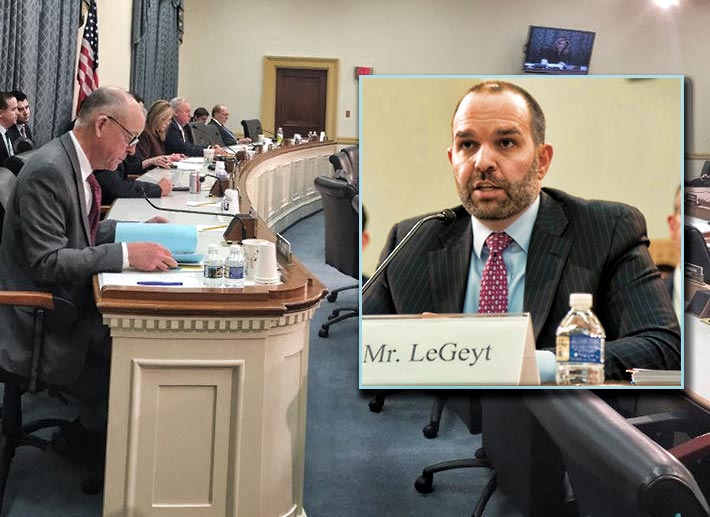
Although Curtis LeGeyt, NAB Executive V.P. of Government Relations, didn’t specifically inform the Communications and Technology subcommittee yesterday that Phase 1 of the repack was a failure, his completion figures did.
Since 2015, the National Association of Broadcasters (NAB) has been informing the FCC that a shortage of qualified tower crews and other concerns will prevent many broadcasters from meeting the ambitious repack window.
They were correct, according to Curtis LeGeyt, NAB Executive V.P. of Government Relations, who testified during a House Communications and Technology hearing yesterday.
He said, “early warning signs already suggest that significant oversight by the Committee is warranted to ensure that no broadcaster is forced off the air or to reduce service for reasons outside their control, consistent with the intent of the Spectrum Act.”
 Phase 1 of the FCC’s 10 phases ended Nov. 30, 2018, and LeGeyt said that the results were not the success story that was expected as he reported a 12% failure rate to the Energy and Commerce subcommittee.
Phase 1 of the FCC’s 10 phases ended Nov. 30, 2018, and LeGeyt said that the results were not the success story that was expected as he reported a 12% failure rate to the Energy and Commerce subcommittee.
LeGeyt said 79 broadcasters completed their moves on time, but 11 broadcasters were unable to meet their deadline due to “reasons beyond their control”.
He said the main reason for the delays were tower crew shortages and weather delays.
LeGeyt also said that an unexpected tragic tower collapse in Missouri had resulted in complications for a North Dakota broadcaster.
“… a tower crew was reinforcing the nearly 2,000-foot (Missouri) KOZK tower in order to support a new antenna needed for the repack when the tower unexpectedly collapsed. The foreman of the crew was tragically killed, and the remaining crew members sustained injuries. It was this crew that was scheduled to work on KVLY’s tower this fall but was now clearly unavailable,” LeGeyt said in his opening comments.
“Because of these setbacks, KVLY faced a terrible decision: shut down their broadcast transmission on their existing channel and go off the air to comply with the FCC rule, or operate on an interim facility that would leave 30,000 viewers without their local news, weather and emergency information. Fortunately, equity prevailed and KVLY was not forced to make this choice. Broadcasters are grateful that the FCC reassigned KVLY and the other stations that were unable to meet their deadlines to another phase. However, the current black-letter FCC rules leave broadcasters exposed. Viewers should not be left in the dark if stations encounter challenges that make it impossible to meet their deadlines despite their best efforts and due to events outside their control.”
According to LeGeyt, broadcast tower workers are already sounding alarms that there will be additional delays further down the schedule, citing system-wide “unforeseen site failures and low power television displacements requiring the pulling of equipment and crews, poor weather conditions delaying tower work by months, stations conducting their latterphase transitions earlier than required by the Commission and unforeseen structural and permitting delays.”
NAB study envisioned these problems in 2015
An NAB-commissioned study from Digital Tech Consulting provided to the FCC in 2015, forecast those possibilities. The report detailed that tower crew shortages would be a primary concern and other possible delaying factors included the time required for obtaining zoning and building permits, negotiating tower lease modifications and dealing with the bureaucracy associated with federal and state-owned lands where some broadcast towers are located.
“Given the expertise and safety training needed for crews to service towers over 1,000 feet, these same representatives ‘believe that they are witnessing the effects of an unrealistic expectation of what the repacking of 987 stations, with associated low power television displacements and FM accommodations, entails. The factors cited above have resulted in demands on the rigging community that simply cannot be met.’ “ LeGeyt said.
The Phase 2 deadline is April 12, 2019, and applies to 116 stations.
LeGeyt cautioned the subcommittee that, “Unlike the stations reassigned in Phase 1, many of these stations are linked with other frequency moves, meaning they cannot be reassigned without impacting another station’s frequency move later in the schedule. While broadcasters will do everything possible to meet their deadlines, this Committee should work with the FCC to ensure it applies a meaningful phase modification and waiver standard that will not force a single station to go off the air or reduce coverage due to circumstances outside their control, as Congress intended.”


















